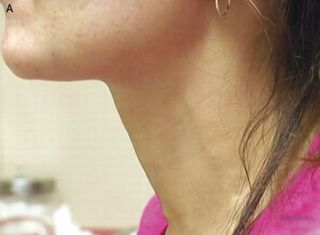Woman's Pulse Surges Through Her Neck, Reveals Heart Condition

A 33-year-old woman in Canada who had large, abnormal pulses that were clearly visible in her neck ultimately needed surgery to combat a bacterial infection in her heart, according to a new report of her case.
The pulses were observed while the woman was being evaluated to see if she needed a replacement heart valve.
Such abnormal pulses are actually common, and are caused by a heart problem known as tricuspid regurgitation, said Dr. Juan Crestanello, a cardiac surgeon and assistant professor of surgery at the Ohio State University Wexner Medical Center, who was not involved with the woman's care.
Video Credit: The New England Journal of Medicine ©2013
Normally, as blood flows from the right atrium (an upper chamber of the heart) down into the right ventricle (a lower chamber of the heart), a valve between the two chambers, called the tricuspid valve, prevents blood from flowing backward. [VIDEO: Woman's Abnormal Neck Pulses Caused by Heart Condition]
"The valves in the heart are like doors," allowing the blood to flow only in one direction, Crestanello said.
But if the tricuspid valve is damaged, some blood can leak from the right ventricle back up into the right atrium, causing tricuspid regurgitation. This causes the right atrium to get bigger, and can change the pressure in nearby blood vessels, potentially leading to abnormal pulses seen in the neck veins, according to the American Heart Association.
Sign up for the Live Science daily newsletter now
Get the world’s most fascinating discoveries delivered straight to your inbox.
Often, people with this condition have heart valve inflammation, or endocarditis, caused by a bacterial infection. The woman in the report had been previously diagnosed with a methicillin-resistant Staphylococcus aureus (MRSA) infection in the heart valve.
The woman required surgery for a new heart valve, and she recovered.
Crestanello said he sees about 10 to 15 patients a year with tricuspid regurgitation, but he treats only patients that need surgery. Some patients can be treated with antibiotics, and don't require surgery, he said.
The report, by researchers at the University of Saskatchewan, was published Nov. 13 in the New England Journal of Medicine.
Follow Rachael Rettner @RachaelRettner. Follow LiveScience @livescience, Facebook & Google+. Original article on LiveScience.

Rachael is a Live Science contributor, and was a former channel editor and senior writer for Live Science between 2010 and 2022. She has a master's degree in journalism from New York University's Science, Health and Environmental Reporting Program. She also holds a B.S. in molecular biology and an M.S. in biology from the University of California, San Diego. Her work has appeared in Scienceline, The Washington Post and Scientific American.
